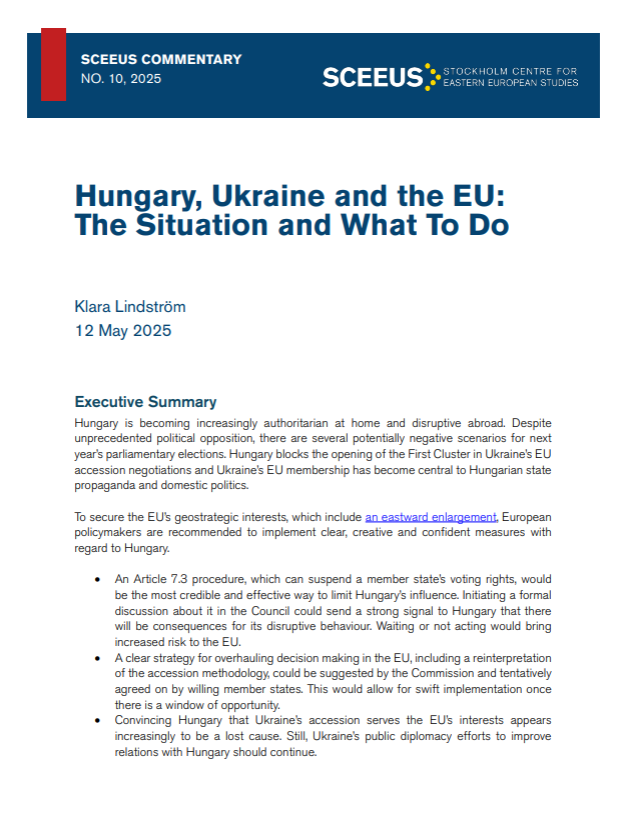SCEEUS Commentary No. 10
Executive Summary
Hungary is becoming increasingly authoritarian at home and disruptive abroad. Despite unprecedented political opposition, there are several potentially negative scenarios for next year’s parliamentary elections. Hungary blocks the opening of the First Cluster in Ukraine’s EU accession negotiations and Ukraine's EU membership has become central to Hungarian state propaganda and domestic politics.
To secure the EU’s geostrategic interests, which include an eastward enlargement, European policymakers are recommended to implement clear, creative and confident measures with regard to Hungary.
- An Article 7.3 procedure, which can suspend a member state’s voting rights, would be the most credible and effective way to limit Hungary’s influence. Initiating a formal discussion about it in the Council could send a strong signal to Hungary that there will be consequences for its disruptive behaviour. Waiting or not acting would bring increased risk to the EU.
- A clear strategy for overhauling decision making in the EU, including a reinterpretation of the accession methodology, could be suggested by the Commission and tentatively agreed on by willing member states. This would allow for swift implementation once there is a window of opportunity.
- Convincing Hungary that Ukraine’s accession serves the EU’s interests appears increasingly to be a lost cause. Still, Ukraine’s public diplomacy efforts to improve relations with Hungary should continue.
Introduction
At the time of writing, Hungary blocks the opening of the First Cluster in Ukraine’s EU accession negotiations. Prime Minister of Hungary Viktor Orbán clearly opposes Ukraine’s EU membership in his official rhetoric. Against this backdrop, policymakers in the EU member states that support Ukraine’s EU integration need to better understand the political situation in Hungary and how it might affect the Hungarian government’s stance on Ukraine. It will also be necessary to consider what measures can prevent Hungary from blocking the accession process.
The Situation
1.Hungary is an increasingly authoritarian and corrupt regime
Hungary is an increasingly authoritarian regime that is becoming more repressive at home and more disruptive abroad. Independent interlocutors reiterate that there are no internal constraints on the regime. Some argue that the system cannot be improved but needs to be replaced. The increasing scale of corruption combined with the freezing of EU funds have exacerbated the gloomy economic situation in Hungary.
2. Despite the unprecedented challenge represented by a popular opposition candidate, only bad or worse scenarios seem likely for next year’s parliamentary elections
Peter Magyar, Hungary’s leading opposition politician, poses an unprecedented challenge to the regime. According to some polls, Magyar’s new political party, Tisza, is more popular than the ruling Fidesz party. However, it is too optimistic to hope that next year’s parliamentary election could put Hungary on a democratic and constructive track.
Given the extent to which the state controls Hungarian institutions and media outlets, Fidesz can win in an election that is neither free nor fair. Orbán might also increase repression and remove Magyar from the political stage. Disorder, demonstrations and even violence cannot be excluded following a disputed election result. EU policymakers need to prepare the EU’s response to such scenarios.
3. The issue of Ukraine's accession to the EU has become central to Hungarian state propaganda and domestic politics
The streets of Budapest are filled with posters of Ursula von der Leyen, Volodymyr Zelensky and Manfred Weber with a slogan that reads ‘do not let them decide over our heads’. The message is clear. A vote for Tisza, which was admitted to the European People’s Party in 2024, is a vote for von der Leyen and Weber, which in turn is a vote for Zelensky and Ukraine’s accession to the EU. This, it is claimed, will cause Hungary severe financial hardship.
There is also an ongoing national consultation in Hungary, in which the citizens are being asked whether they support Ukraine’s EU accession. In connection with this nationwide opinion survey, citizens have received a letter that outlines a number of negative consequences should Ukraine join the EU. Similar national consultations have been used by Orbán in the past to shape public opinion and mobilise support.
Maintaining power and ensuring regime stability are the main drivers of Orbán’s policies at home and abroad. Orbán opposes Ukraine’s EU membership as a way to position himself against his main political challenger. Furthermore, highlighting the financial cost of Ukraine’s EU integration – and suggesting that funds supposedly destined for Hungary are being diverted to Ukraine – could help to justify the country’s economic struggles.
What To Do
4.Continue Ukraine’s de facto EU integration regardless of political blockages
Even without the First Cluster Opening, the Commission could continue Ukraine’s de facto EU integration by pursuing the screening process and implementing steps of gradual integration. For example, Ukraine could be brought into the institutional structures of the Common Foreign and Security Policy (CFSP) and into specific sectors of the internal market.
5. Clear and confident measures against Hungary will be necessary to secure the EU’s geostrategic interests, including an eastward enlargement
Orbán will not be convinced by arguments concerning Ukraine’s readiness to join the EU, since his opposition to Ukraine is based not on substantive issues, but on domestic political concerns. Clear and confident measures will therefore be needed to prevent Orbán from blocking Ukraine’s EU accession.
The freezing of EU funds to Hungary has had an effect on the Hungarian economy and allowed the EU to make some transactional deals with Orbán. The possibility of freezing even more funds could be investigated as a way to increase the EU’s leverage over Hungary. However, other political measures might also be necessary, given the geopolitical challenges facing the EU.
6. An Article 7.3 procedure could be the most credible and effective way to limit Hungary’s institutional influence
Article 7.2 and 7.3 of the Treaty on European Union allows for the suspension of the voting rights of a given member state in the Council if that member state seriously and persistently breaches the principles on which the EU was founded. Some member states have resisted using Article 7 against Hungary, fearing that the same procedure might be used against them. To mobilise support for implementing it this time, like-minded member states could emphasise the principle of solidarity and that the external credibility and hard security interests of the EU are at stake.
A group of resolute member states could propose that the Council place the activation of Article 7.2 against Hungary on its agenda. Initiating a formal discussion about Hungary in the Council could send a strong signal to both its leadership and its citizens that there are legal and political consequences for disruptive behaviour within the EU.
7. Now is the time to act
While obtaining support from all member states to suspend Hungary’s voting rights will be far from easy, recently unthinkable initiatives are becoming a reality in today’s challenging geopolitical situation. The Trump administration’s policies have enhanced the need for European unity and decisiveness. This could embolden hesitant member states to take action against Hungary.
Furthermore, there are more risks attached to waiting than to acting. Hungary is becoming increasingly disruptive and repressive, and as noted above it is likely that there are only bad or worse scenarios for next year’s parliamentary elections there. More Orbán-friendly political parties could also gain power in other member states in the coming years, which would make it even more difficult to obtain the unanimity required for Article 7.2.
8. Prepare for more ambitious reform of decision making in the EU, to allow for swift implementation when there is a window of opportunity
A clear strategy for overhauling decision making in the EU could be suggested by the Commission and tentatively agreed on by willing member states. Such preparations would allow for a swift move to more decision-making by qualified majority voting as soon as there is a window of opportunity in the Council.
Similarly, there is no provision in the treaties that stipulates that all steps of the EU enlargement process need to be decided on unanimously. The Commission could prepare a legal package that reinterprets the accession methodology, so that unanimity in the Council is only required when the First Cluster is opened and the last closed. Intermediate chapters would be decided on by qualified majority. Such a reinterpretation could futureproof the enlargement agenda against political blockages.
9. Ukraine’s public diplomacy efforts to improve relations with Hungary should continue
Convincing Hungary that Ukraine’s accession serves the EU’s interests appears increasingly to be a lost cause. The Hungarian government has chosen its narrative about Ukraine’s EU membership. No matter what reforms Ukraine implements – including on the issue of national minorities – Hungary will continue to obstruct the process and to try to gain political leverage from it.
Nonetheless, Ukrainian public diplomacy efforts can still alleviate Orbán’s personal animosity towards Zelensky and improve the relationship between Ukraine and Hungary. The recent agreement between the countries to hold regular talks aimed at unblocking Ukraine’s EU accession negotiations is a step in the right direction. A Ukrainian charm offensive could include public acknowledgement of Hungary’s long history of economic support to Transcarpathia and a public statement of gratitude for Hungary’s initiatives to support the Hungarian minority in Ukraine.



Resilience and vulnerability: Impressions from a freezing Ukraine